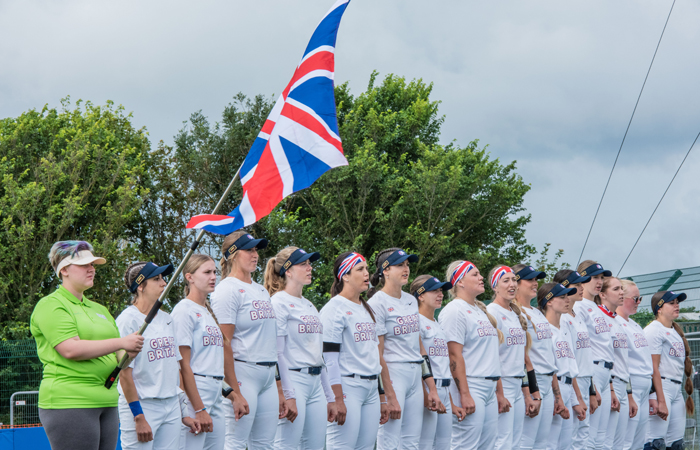By Bob Fromer
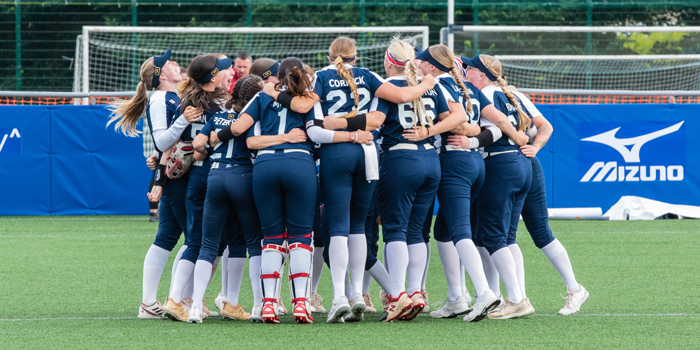
Tuesday 18 July -- For the first three days of the WBSC Women’s World Cup Group A in Balbriggan, Ireland, it was the GB Women’s  Team that lit up the tournament.
Team that lit up the tournament.
An accomplished 2-0 win over World #9 Australia in the opening game of the tournament on Tuesday 11 July was followed by another 2-0 win on Wednesday over World #3 Chinese Taipei.
For many observers, these wins were regarded as upsets, but for the GB players and coaching staff, it was simply confirmation that this GB Women’s Team is one of the better national teams in world softball, far better than its world ranking of 16, distorted by the methodology of the WBSC ranking system, would suggest.
On Thursday 13 July, GB scored seven runs in the third inning on the way to a 7-0 mercy rule win over host team Ireland.
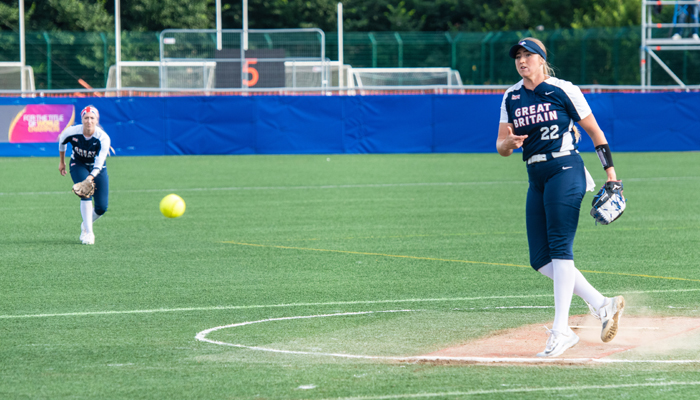
These wins all featured outstanding pitching from GB ace Georgina Corrick, formerly the NCAA Division 1 College Pitcher of the Year, and excellent defense from the entire team, including a number of highlight-reel plays that helped keep opponents off the scoreboard, particularly in the tense and eventful win over Chinese Taipei.
Outfielders Kendyl Scott and Alana Snow threw runners out on the bases, Tia Warsop made two amazing catches in left field, and Morgan Salmon at third, Sydney Brown at shortstop and Katie Burge at second all made a series of excellent plays.
Given the fact that GB’s pitching and defense did not give up a single run over these three games, the offense was adequate in the games against Australia, where the key blow was a home run by centre fielder Kendyl Scott, and Chinese Taipei, where a two-run home run by Georgina Corrick accounted for all the scoring.
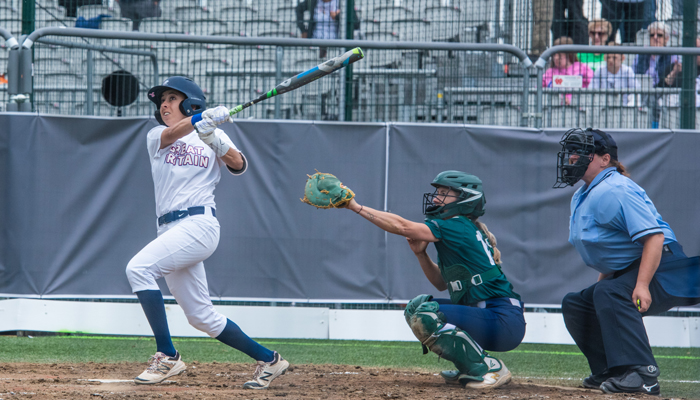
Up to this point, all had gone well for the GB Women. But things were about to get tougher.
Problems
On Friday 14 July, heavy and prolonged rain and strong winds began to play havoc with the schedule of a tournament that lacked adequate contingency planning.
Friday was to have been the final day of round-robin play in the competition, and four games were scheduled: Australia v Chinese Taipei, Botswana v Great Britain, Great Britain v USA and USA v Ireland. In the event, only one game – Australia v Chinese Taipei – could be played, and that game began in the morning and then had to be suspended, not finishing until the rain relented in the early evening. It was a harbinger of worse to come on Saturday.
The loss of three of the four final round-robin games meant to be played on Friday presented the World Baseball Softball Confederation (WBSC) tournament officials with a problem. Regulations suggested that, for the integrity of the tournament, round-robin games had to be completed before the tournament could move on to the modified Page Playoff that had been scheduled for Saturday. The Page Playoff, involving the top four teams from the round-robin standings, would determine which two teams would claim the prize that this tournament was all about: qualification for the WBSC Women’s World Cup Finals, scheduled to be played in Italy in July 2024.
At this point, GB’s three wins on Tuesday, Wednesday, and Thursday, had put them in a great position: they were guaranteed to finish no lower than second in the round-robin standings. The significance of this was that the first and second place teams from the round-robin have the advantage in the Page Playoff of being able to lose their first game and still – if they can win the next game – qualify for the World Cup Finals. For the third and fourth place teams from the round-robin, a loss means elimination.
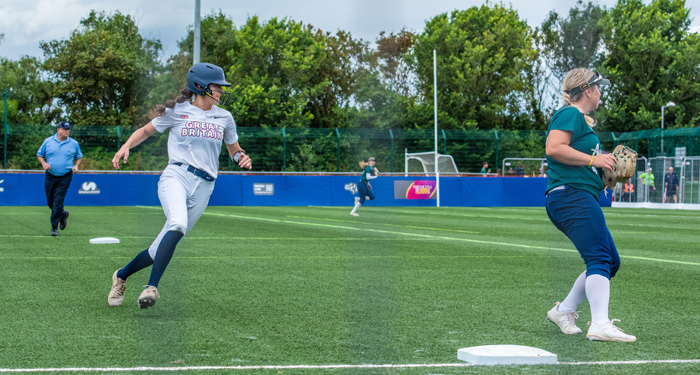
On Friday afternoon, with three round-robin games still unplayed and no chance of playing them that day, WBSC officials met to consider what to do. One option was to follow the regulations, which would mean completing the round-robin games on Saturday (weather permitting) and then using the round-robin standings to determine the two teams that would qualify for the 2024 Finals. Had they gone this route, GB and the USA, both with 3-0 records at the time, would have claimed the places.
But as pure luck would have it, none of the three unplayed round robin games, whatever their results, would have changed the final round-robin standings and the line-up for the Page Playoff – and this gave the WBSC officials a second option: to abandon those games and go straight to the playoffs on Saturday.
That was the option they chose, and it meant that the GB Women would have to win one of two games on Saturday – against the USA or the winner of a game between Australia and Chinese Taipei – to reach the Finals.
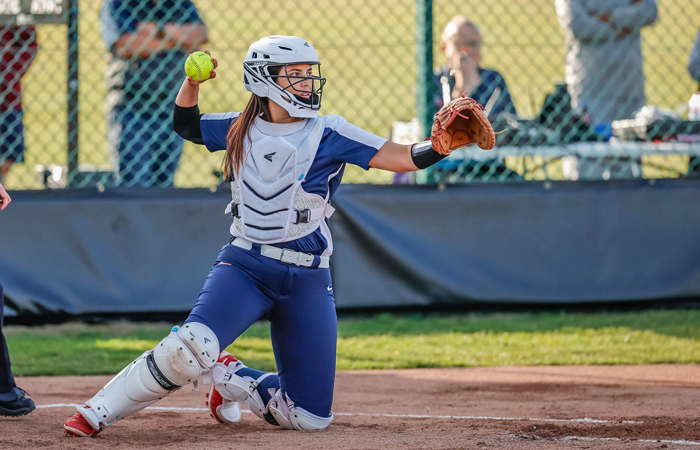
Saturday
So far, the disruption to the tournament caused by the rain on Friday had affected all six teams more or less equally. But on Saturday, circumstances began to conspire particularly against the GB Women.
With more rain forecast to begin around the middle of the morning on Saturday, WBSC officials decided that the first game of the Page Playoff would be the 1 v 2 game between GB and the World #1 USA, and that it would start at 8.00 am. For both teams, this meant getting up at 5.00 am, a time when the tournament hotel near Dublin Airport, 30 minutes or so from Balbriggan, was unable to provide the normal breakfast service: not great preparation for such an important game.
One question was whether it would have been more appropriate for the 3 v 4 Page Playoff game between Australia and Chinese Taipei to have been assigned the 8.00 am start, giving the teams that had finished highest in the round-robin standings more rest. But that would have meant the loser of the 1 v 2 game having to play back-to-back games later in the day: the decision the WBSC took meant that the burden of back-to-back games fell on the lower-ranked winner of the 3 v 4 game, and that’s where they must have felt the biggest advantage lay.
That might have been true if the day had proceeded normally, but it didn’t. GB and the USA were in the bottom of the third inning in their 1 v 2 game, with the USA leading 2-0, when the rain returned just before 9.00 am and play was suspended.
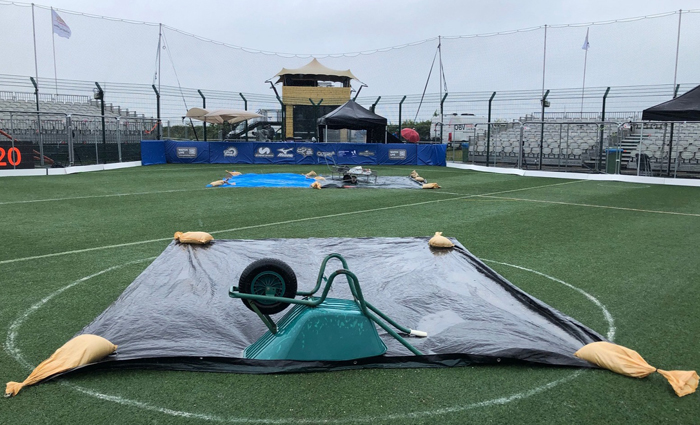
It was mid-afternoon before the rain eased, and GB and the USA were asked to resume their game at 4.00 pm. Now the question was: could this game and the two to follow be completed in the time available, given that the lights at the field in Balbriggan, designed for large-ball sports, could not support softball play in full darkness?
Final games
The game between GB and the USA was unlikely to be won by Great Britain. The GB coaching staff had made the decision that rather than pitch Georgina Corrick twice in one day against strong opposition, it would be better to hold Georgina back, assuming GB lost against the US, to pitch the game against the winner of the Page Playoff 3 v 4 game between Australia and Chinese Taipei, teams we had already beaten, to clinch GB’s place in next year’s Finals.
In the event, GB pitchers Rebecca Faulkner, who started the game and pitched until it was suspended, and Hannah Edwards, who was in the circle when the game resumed more than seven hours later, contained the USA offense well until a five-run outburst in the bottom of the fifth inning ended the game on the mercy rule with the score at 7-0.
That meant the USA had clinched their place in the Finals and were done for the day after posing with the specially-created and rather garish sign below.
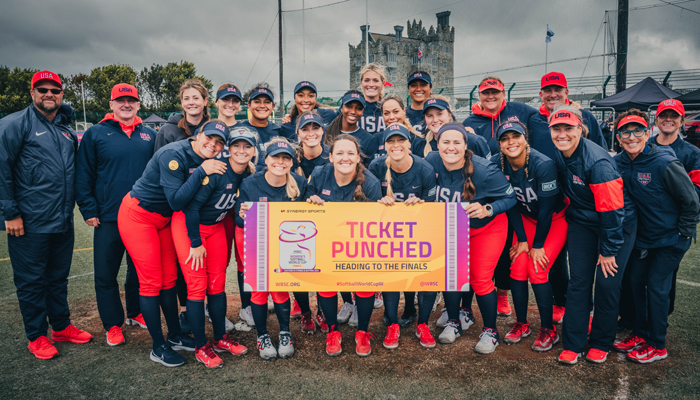
Now Australia and Chinese Taipei took to the wet, windy and cold Balbriggan “all weather” astroturf field shortly after 7.00 pm and played their 3 v 4 game. Australia was the better team and carried a 4-1 lead into the seventh inning, but Chinese Taipei staged a late rally, and might have tied the score if it hadn’t been for a baserunning mistake that cost them a vital out. In the end, Australia prevailed by 4-3 and would now play GB for that second spot in the World Cup Finals.
The GB v Australia game began after 8.30 pm, with rain still falling, the wind still howling, darkness beginning to descend and temperatures more like winter than summer. The WBSC was clearly desperate for a result, but should the game have been played at all? Should the athletes on both teams have been forced to play such an important game under those conditions?
In the event, all the runs scored in Australia’s 4-1 win might well have been due, at least in part, to the conditions. GB’s run in the first inning came on a wild pitch by the normally very accurate Ellen Roberts.
When Australia scored their decisive four runs in the fifth inning, they came because of a passed ball, a completely uncharacteristic sequence of two hit batters and a walk by Georgina Corrick, and an error from the previously impeccable GB infield.
The cliché that “the conditions are the same for both teams” is clearly true, but doesn’t speak to the question of whether they should have been playing in those conditions at all.
And, by the time the game finished, just before 10.00 pm, with auxiliary lighting trying to augment the inadequate field lights, the GB Women’s Team had been up and under pressure of one kind or another for 17 hours, far longer than Australia.
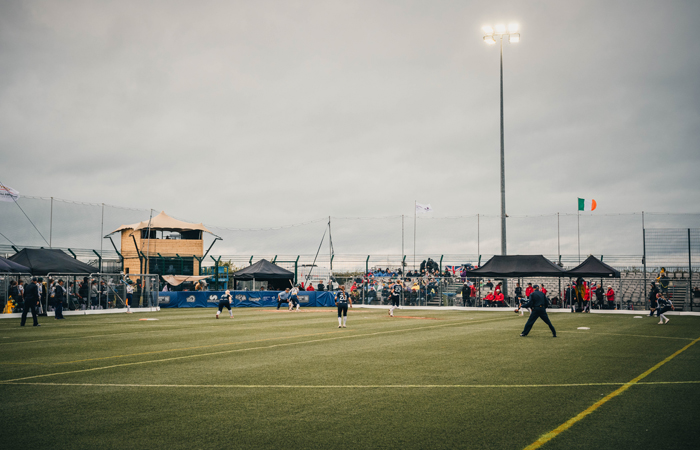
Looking forward
The GB Women’s Team's stated goal for this tournament was to finish no lower than third and to beat at least one team ranked significantly higher than we are. That target was exceeded.
And while the team narrowed failed to achieve qualification for the World Cup Finals, there is still an outside chance that we could be awarded one of two wild cards that might be available for third-place teams in Groups A, B and C (Group B is now underway in Spain and Group C will be played next week in Italy).
GB’s artificially low world ranking is the biggest obstacle to this, though the WBSC might be persuaded to take a second look.
But the GB Women’s Team, which has been under new and much more professional management this year thanks to funding from UK Sport, has come out of the tournament with enormous credit, and high hopes for the future.
The current GB Team is made up primarily of younger players, by design, to build a team that will reach its peak in 2027 and 2028 and can hopefully qualify for and medal in the 2028 Olympic Games in Los Angeles – always assuming that baseball and softball are included. An announcement on that will be made in the autumn and is widely expected to be positive.
The team’s performance in Balbriggan exceeded expectations because, faced with three teams ranked in the World Top Ten, GB beat two of them, performed strongly against the USA, and could well have beaten Australia again in the crucial final game except for one bizarre inning that may have owed much to the conditions under which the game was played.
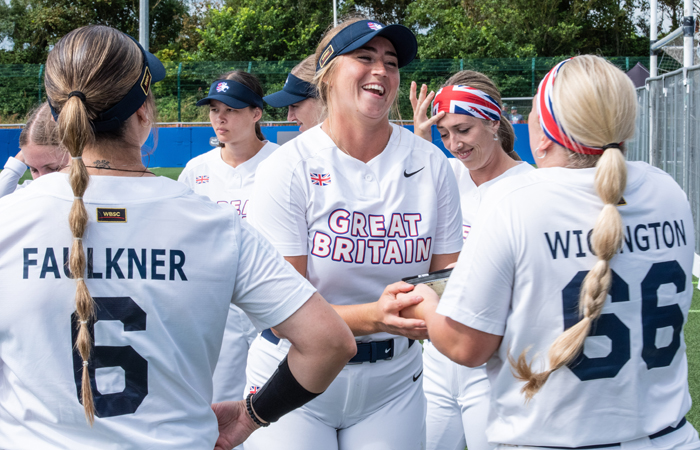
Georgina Corrick led the tournament in most pitching categories, including innings pitched and strikeouts, and a number of other GB players made it into leaderboard categories, including third base player Morgan Salmon, who ranked third in the tournament with 10 assists, and Tia Warsop, who tied for the tournament lead in stolen bases.
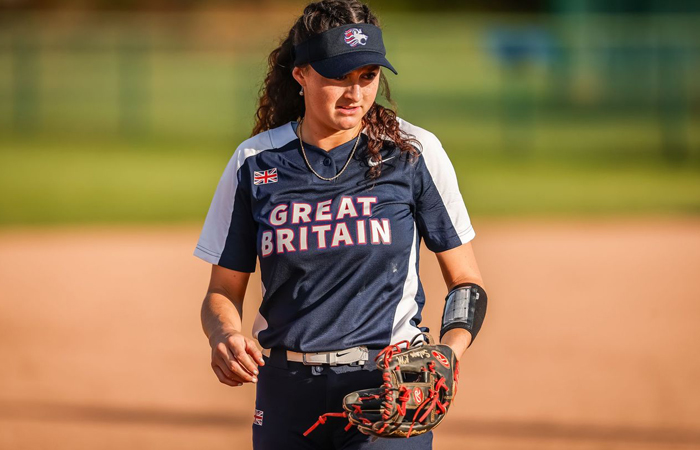
What is very clear from this tournament, and from recent European Championships and the Euro-Africa Olympic Qualifier in 2019, is that GB is now one of the top ten countries in world softball, whatever the world rankings say, and will almost certainly get better.
This is not just down to the quality of the players, but to the fact that under the new performance regime led by Head Coach Tara Henry, the team is now better prepared, both physically and with regard to knowledge and information about its opponents, than any GB Women’s Team in the past.
In the end, the GB Women’s Team has come away from an exhilarating but trying week feeling proud of its achievements, disappointed at the final result, but ultimately feeling positive and hopeful about the future.
As the current players mature and new players are added to the programme, this could be, in the words of GB Performance Director Gary Anderson, “a very special team.”
